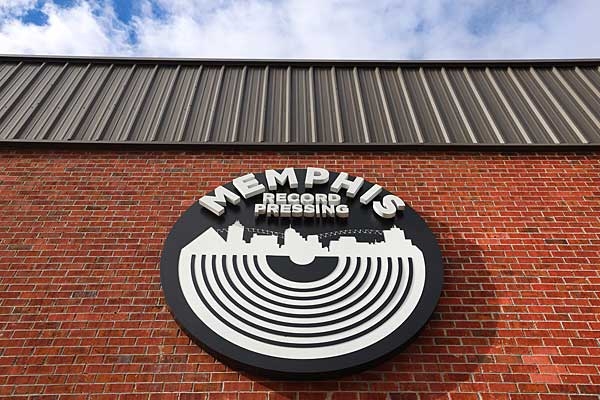| Columns Retired Columns & Blogs |
Let's see how MOFI weathers the storm.

The long wait for vinyl-pressing capacity appears to be over. In response to huge demand, new vinyl presses are coming online in the US, as new companies are formed and established plants expand.
Tennessee is emerging as a center for vinyl pressing in the US. Memphis Record Pressing was founded in 2014; last year, the company pressed more than 7 million LPs. Since June 2016, MRP has had a strategic partnership with GZ Media in the Czech Republic, reportedly the world's largest record-pressing operation. This arrangement gave MRP access to vinyl stampers, "along with technical and engineering supply to include new vinyl pressing equipment," MRP CEO/co-founder Brandon Seavers wrote, in an emailed response to questions.
MRP is investing $30 million in its pressing plant and packaging operations. The expansion includes construction of a 33,000ft2 building adjacent to its current facility, which will house 36 new presses. MRP expects to double its workforce and run its presses 24/7, yielding capacity of some 125,000 records per day. MRP expects the facility to be operational by late September, a month or so after this magazine hits the streets. The company's packaging operations will also expand, moving into a refurbished, 100,000ft2 warehouse.
MRP isn't Tennessee's only new record-pressing action. GZ Media recently opened a US headquarters in the Music City for its subsidiary company, Nashville Record Pressing. NRP didn't respond to questions, but reports say their LP pressing and packaging operations should be starting up as I write this in early June.
Also in Nashville, United Record Pressing (formerly Southern Plastics), another large supplier, is said to be adding 48 more presses, although Stereophile was unable to confirm this.
Finally, Nashville is home to a boutique pressing plant, VinyLab. VinyLab, which handles small vinyl runs starting at 250 copies, is preparing to open B Sides at the VinyLab, a bar/restaurant/music venue adjacent to the plant, with views of the skyline and record presses in action—a trend also seen at Jack White's Third Man Records, in Detroit.
In Denver, Colorado, Vinyl Me Please is taking a similar operations-on-view approach at their forthcoming, 14,000ft2 record-pressing facility, called Vinyl Media Pressing—another VMP. The new plant is under construction and due to open in January. (Up to now, GZ Media pressed most of VMP's releases; a smaller number were pressed at RTI.) VMP, which focuses mainly on audiophile-grade recordings, has hired Gary Salstrom as general manager; Salstrom previously worked at highly regarded Quality Record Pressings, Analogue Productions' facility in Salina, Kansas. Like Analogue Productions, the new VMP is "looking at higher-quality, lower-volume pressing," Salstrom told me by phone. "We're catering to a smaller group of people to be able to guarantee turnaround times."
The building that will house VMP's pressing plant was a winery in the 1920s. Soon it will house not just the pressing plant but also a listening room with a wall of records and several turntable stations where visitors can enjoy music. In front, a retail space will sell records, beverages, and snacks. Another room will house a high-end system, for critical listening. "We want to make it very visitor-friendly," Salstrom said. Views of the pressing and plating areas are part of the plan.
VMP will press mostly from lacquers, but Salstrom can do DMM in a pinch. "In my days at Wakefield Manufacturing, in Phoenix, I was one of the first people in the US trained in DMM plating," he said. "Since most audiophiles don't like the sound produced from DMM cutting, we will probably not see many projects on DMM."
Meanwhile, the new VMP facility may itself do something to address the lacquer shortage. "We'll start with just plating and pressing and are considering mastering lacquers and possibly printing labels and such down the road," he said. "One bite at a time."
In Minneapolis, Minnesota, optical-media manufacturer ADS Group (under its "CopyCats Media Division" name) is building a new, "modern-day" pressing plant with five presses to start; a 65,000ft2 space allows room for expansion.
Another new entrant: Mobile Fidelity Sound Lab (MoFi)—or, rather, Jim Davis, its owner. In answer to a query from Stereophile, MoFi VP of Sales and Marketing Jonathan Derda released a statement via email: "Jim Davis, the owner of Mobile Fidelity Sound Lab (MoFi) and Music Direct, will open a new record pressing plant expected to start operating next year." Details forthcoming.
There's a risk that all that capacity will flood the market, which could make records cheaper but could also lead to cost-cutting and, hence, declining quality in an industry that currently is offering perhaps its best quality ever. For the moment, though, everyone's happy, excited about the future. "There's such a shortage of pressing plants that there's enough business for everybody," said Michael Fremer in an interview, echoing widespread sentiment. "The pressure has just been crazy to get stuff done. Everybody's happy, everybody's sharing information. I never expected any of this to happen. It's incredible."

I think great things will come when these existing companies aren't constantly rushed to make mistakes (center, flat, noise)...
I have faith and patience.

I agree that building new plants and expanding existing ones seems encouraging from many standpoints: capacity, quality, competition that could support better quality, less rushing, etc.

Memphis Record Pressing is the sort of new-school plant that just pumps out product for labels where “good enough” and minimizing costs matter more than delivering quality records. I don’t take any joy in ragging on them, but I’ve learned the hard way, and my heart sinks when I see “MRP” in a runout groove. I can’t imagine them expanding like crazy is going to do anything positive.

In any case, the good news is, there are more options in addition to increased capacity!